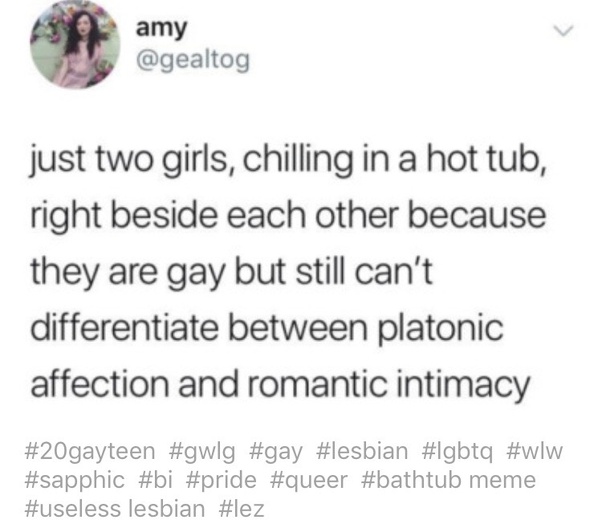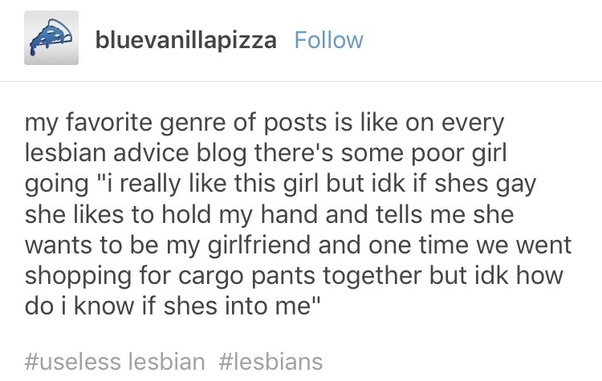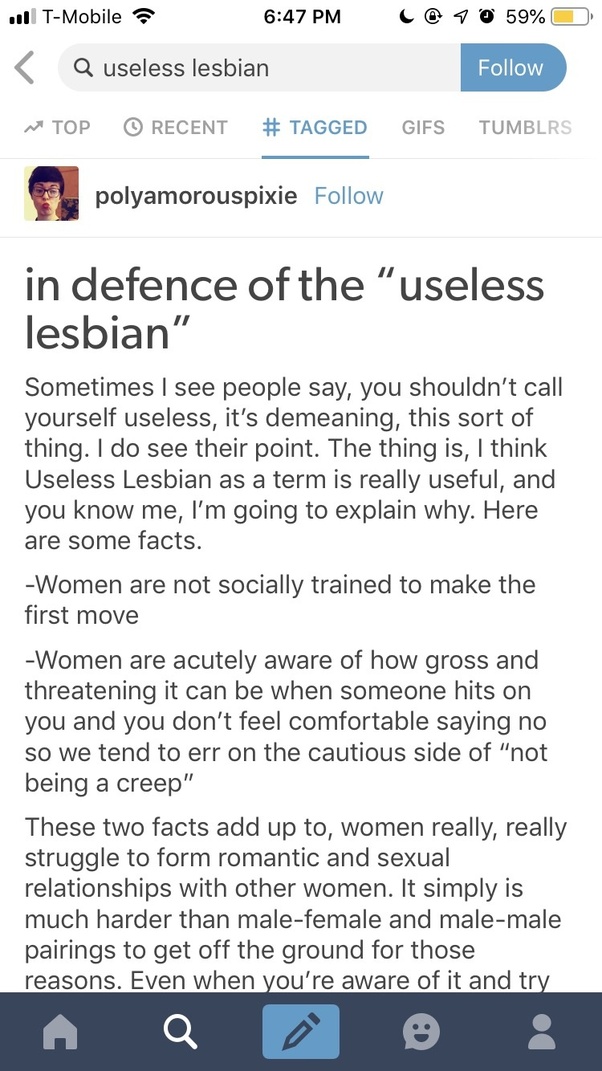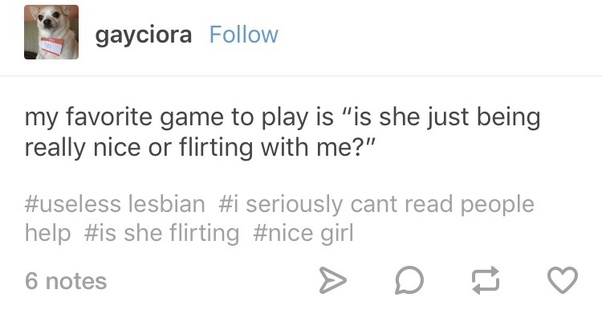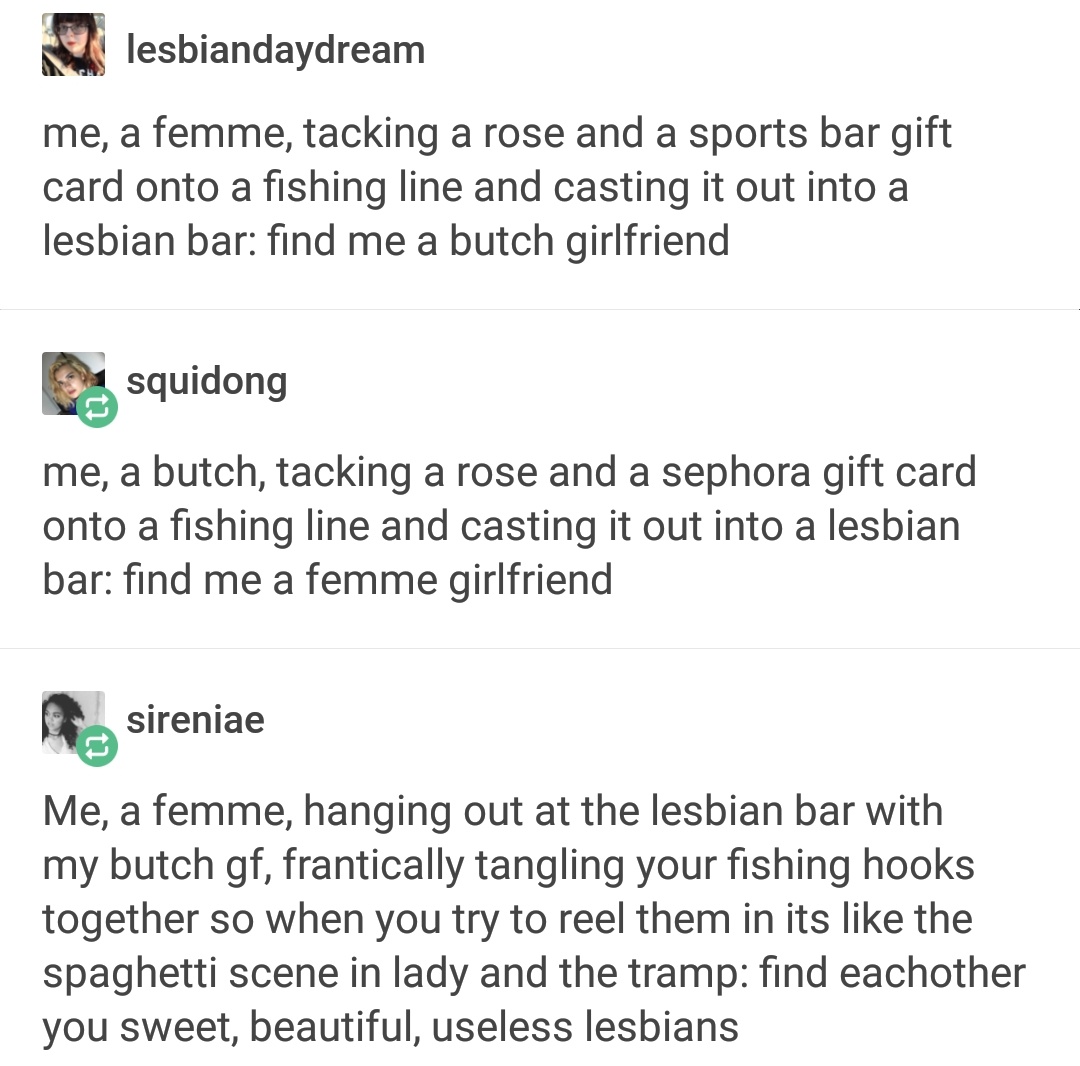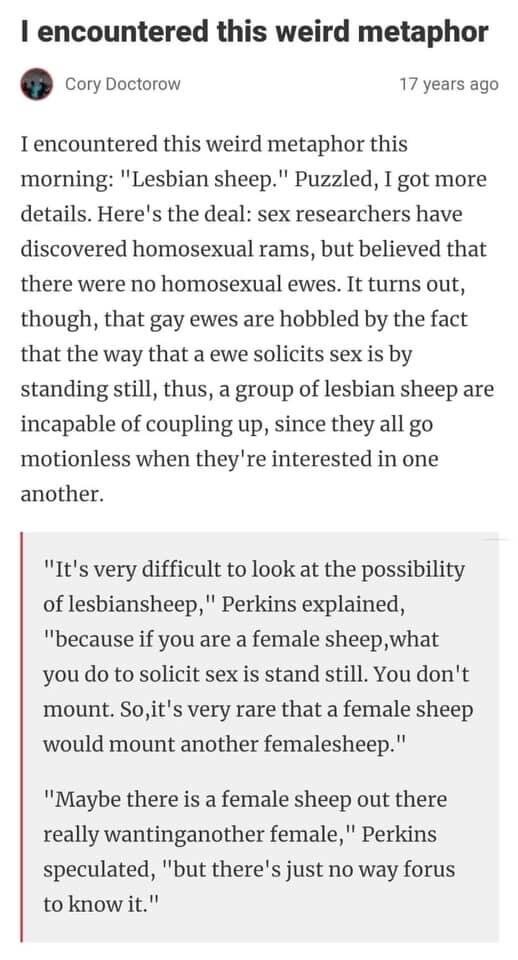The Lesbi-can Standoff
[Estimated reading time: 12 minutes]
People...I like women. I mean, I like women. But also, I am a woman. This diabolical combo puts me in a unique position. Aside from having to spend an inordinate amount of time trying to figure out whether I have a crush on a woman or whether I just want to be her, it also makes dating quite difficult.
I’m often attempting to date people that, like myself, have been socialised to be passive when it comes to romantic entanglements. What does that actually mean? I’m glad you asked! I thought I’d share some of my experiences and observations with you, just on the off chance that it’s something you can relate to.
Where are our role models?
As much as we might like to think otherwise, most of us are, at least in part, a product of our environment. We’re influenced by the media we consume, by the people we socialise with, by our parents’ opinions and a whole host of other things. All of this helps to shape the way we engage with the world on a daily basis.
If your parents raised you with a certain set of ethics or values, you’re much more likely to have those values as part of your identity. If the romantic representation you’re raised on most closely resembles Disney, it’s more likely that you’re going to grow up with a social script that tells you to find a heterosexual life partner, get married, have children and grow old together.
For women who are attracted to women, a huge number of us were raised with hetero-romantic media, values, and standards. Basically, the movies and tv shows we watched showed us how a man should woo a woman. The pop songs we listened to taught us about what happened when we were loved by a man (and then cheated on by him). Most of the books we read were likely to show a love interest between a man and a woman. And I’m not even going to go into the ads that we were exposed to! For all of the media we were exposed to, the overwhelming majority would reinforce the idea that, when it comes to love, a man makes the first move.
Hetero-romantic narratives predominantly show men as the sexual initiators. Thousands of years of western representations of romance reinforce messages about chivalry and etiquette and how it’s the shy, coquettish young ladies who are most admired. Many narratives rely on women playing tricks or mind games to get a man to notice her, to finally ask her out. Why can’t she just walk up to him, announce her attraction and tell him to get back to her if he’s interested?
You might be asking what any of this has to do with women dating women? Well it’s simple - when every reference point you have for romance tells you that you need to wait for a man to make the first move, what do you think happens when there’s no man at the table?
The Lesbi-can Standoff.
It’s like a Mexican standoff, but with less hats and guns, and more birkenstocks and flannel.
Two women go on a date.
But maybe they’re not sure if it’s a date.
Maybe it’s just a friends thing...two gals being pals?
Did she say the word ‘date’ when she made the invitation?
At the end of dinner they linger, talking about this and that.
Both of them are thinking “I really want to kiss her” but neither of them do, because they’re waiting for the other person to make the first move.
Because maybe this is one sided.
Maybe she just likes me as a person.
Or maybe after three hours of my company she’s realised she’s not physically attracted to me?
Maybe that casual hand hold halfway through dinner was just an accident?
Maybe she just wants to be friends?
Maybe she’s straight?
The Lesbi-can Standoff is when you both suspect that you’re into each other, but neither one of you is game enough to do anything about it. Because neither of you has a reference point for what it should look like. What signals do two women who are into each other send? So, to be safe, you both just wait. Because someone has to make the first move…eventually.
The “Useless Lesbian”
In online queer culture there’s a “useless lesbian” trope that gets referenced every time a woman is hilariously hopeless in her attempts at love with another woman.
Usless Lesbian memes often look like comedy through hyperbole; things that don’t actually happen in real life, just on Tumblr. Unfortunately I have the personal experience to prove otherwise (and apparently so does Twitter).
A few years ago I had the fortunate experience of dating someone who looked like Sansa Stark. On our first date, through no fault of my own, she managed to get a concussion. After the paramedics had given her the all clear, my only thought was relief that we wouldn’t be playing the Lesbican Standoff on the first date. Now I could wait and see if she wanted a second date to see if she was interested in me! (Until I realised that maybe her request for a second date was symptom of the concussion).
For our second date we snuck vodka into an X-Men movie, and I got to look at her sitting next to me AND on the big screen!
Then she invited me back to her house, but probably just so we could keep talking.
Then she invited me into her bedroom, but probably just so she could show me her linens.
When she invited me to undress I was skeptical that she wanted anything more than my opinions on graphic novels.
By the time my face was buried between her legs, my brain started suggesting that “maybe this is what she does this with all her friends...”
There’s a dating app created solely for lesbian, queer, bisexual and bicurious women. Ignoring the many UX issues, it’s commonly known as a place to go and match with attractive people that you have absolutely no intention of ever talking to. The app is a digital embodiment of the Lesbi-can Standoff.
Each person on the app knows that the other person won’t make the first move, so no one feels comfortable being the person who actually does. What should have been a useful and safe space for queer women is instead a hilarious exercise in sexual frustration that demonstrates just how hard it is for women to be sexual aggressors.
Finding fellow queers in the wild
The easy conclusion to draw from all this is that it’s best to avoid online dating and stick to organic scenarios where you meet queer women in the wild, and can tell you’ve both hit it off and mutually agree to a date. Great idea. Now good fucking luck figuring out which women are queer, and which ones are just super friendly.
The natural dialogue between women is kind of flirty, and it turns up to 11 when you add alcohol. Every time I have a conversation with a straight woman, I am inherently aware of each time she compliments me, each time she touches me, each time she laughs at my truly terrible jokes. Because all of these things, if they came from a man, would be evidence that he was interested in me. But from a woman probably means we just met in the bathroom of a restaurant and she must know where I got my shoes from.
One of the reasons so many queer women wear badges, lanyards, jewellery, or style themselves in conventionally ‘queer’ ways is because it’s a quick and easy way to start a conversation with other ladies who like ladies. And it’s less problematic than if we all wore pink triangles.
Internalised homophobia
I’m not the spokeswoman for all the ladies who love ladies, so I can’t presume to say that this is the case for everyone, but I suspect that a small part of the Lesbi-can Standoff equation comes down to internalised homophobia.
I spent my formative sexual development at a co-ed boarding school. I’m sure it’s a much more accepting place now (probably…maybe), but when I was there the homophobia was tangible. Living in dorm rooms where adolescent girls were regularly walking around naked, students seemed to be constantly on alert for anyone who seemed to be enjoying the view too much. Such people became social pariahs, ridiculed and ostracised. The overwhelming consensus being that they were ‘gross’ but with undertones they were also predatory.
All of this gave me a wonderful internal narrative when I’m around attractive women along the lines of “Oh my god, don’t look at anything, don’t touch them, don’t smile for too long, oh god bad things are going to happen, she’ll hate you if she finds out you think she’s pretty!”
When you grow up learning that girls are actively disgusted by your attraction to them, it can be hard to incentivise yourself to make the first move.
You’ve learned to fear not just rejection, but ridicule, ostracism and revulsion. And for some people, violence.
No one wants to be the predator
Something a lot of queer women have in common is an overdeveloped sense of other people’s consent and personal boundaries.
Most women have been on the receiving end of behaviour, predominantly from men, that’s made them feel uncomfortable.
Most women know what it feels like to be put in a position where they don’t feel comfortable saying no.
They know what it’s like to be in a situation they want to escape from, but are unable to do so in a socially pleasing way.
So when these same women are in a position where they’re expected to be the sexual aggressors, they’re hyper aware of not wanting to put the object of their affection in a situation where they feel unsafe.
For me this also intersects with my physical appearance. I tend to go on dates with women who are slimmer, or shorter, or in some way more petite than myself. So when I’m thinking about making a move, I’m acutely aware of the physical threat that I might pose. I recall the times where I’ve been propositioned by people who physically intimidated me. Because the last thing I ever want to do to another woman is make her feel unsafe; so I err on the side of caution, and leave it up to physically smaller person to make the first move.
This of course backfires horribly.
Because I’m physically bigger or less femme, other women are more likely to see me as the ‘top’ or ‘dominant’ person in our dynamic. Even within queer culture, we look for the ‘masculine’ characteristics that will signpost which person will take on the role of the ‘man’ and therefore be the sexual ‘aggressor’ or instigator.
Letting them down gently
We’ve all heard dating horror stories from heterosexual encounters. The truly horrific ones usually make headlines, but the ones that get shared on social media often involve someone who is hilariously ignorant of what constitutes socially acceptable behaviour. For many of my friends, this behaviour involves men making statements about what they do and don’t find attractive in women.
“Oh, you’re really tall...I prefer women whose height makes me feel like I can physically intimidate them.”
“You’re how old? Yeah, I only date women who I could have fathered.”
“I see you’re a woman of significant proportions. Well despite being the approximate dimensions of the Hindenburg, I believe that any woman larger than a size 4 is an abomination.”
Men in the dating scene seem to labour under the mistaken impression that our desired outcome from a date is their approval of us.
It’s really not.
The point is, every woman has been judged on her appearance at some point in her life.
Every woman has had someone comment on the way she looks.
We all know the uniquely hurtful frustration of being told we’re not good enough for a standard we’re not supposed to care about, but that we are constantly measured up to. So, as a woman, when I date other women, I am terrified of perpetuating this.
If I go on a date with a woman, and I’m just not physically attracted to her, I have no idea how to tell her this.
While I personally am so used to being rejected that someone has to really go out of their way to insult me, I tend to assume that other women will be devastated by it.
To deal with this I make a pre-emptive strike; I tend to say that I’m more interested in friendship, but that I’m open to seeing where things go. This is a lie. I have lots of friends. Most of whom I already don’t have sex with. That’s not a problem I’m looking to solve. But it’s easier for me to tell a woman that I’d rather just be friends than to tell her that I’m outright not interested in her physically or socially. The real kicker though is that this works both ways.
I go on dates with women, and then find that without ever discussing the possibility of sleeping together, we both just silently relegate ourselves to the gal pal zone. It’s as though we approach the Lesbi-can Standoff and both silently realise that we don’t have the energy for it, so we just assume the other person is only interested in a friendship.
Don’t get me wrong; I don’t regret forming these friendships! But it does mean that I now have more friendships than I have time in my life to maintain them. One for every failed date. And there have been a lot of failed dates.
We deserve better
At the end of the day, most of these experiences represent personal baggage that I will eventually need to discuss with my therapist when she has a spare 20 years. But I also know that I’m not alone with these experiences. I know that I am one among many, many “useless lesbians”.
But here’s the thing - we’re not useless. It’s not our fault that we don’t have representation or education that includes us.
We need better depictions of homo-romantic narratives - ones that don’t end in heartbreak or death (we’re sick of burying our gays).
We need to continue to challenge homophobia, particularly in institutions that provide formative experiences for young people.
We need sex education that not only addresses different sexualities, but that also provides comprehensive education around consent, so that we normalise conversations that establish what both parties are comfortable with.
And we need to continue to challenge gender roles in romance (and everywhere else).
Because until we do all of that, a lot of women are going to continue to find themselves in Lesbi-can Standoffs.
That is all.
You may go now.







